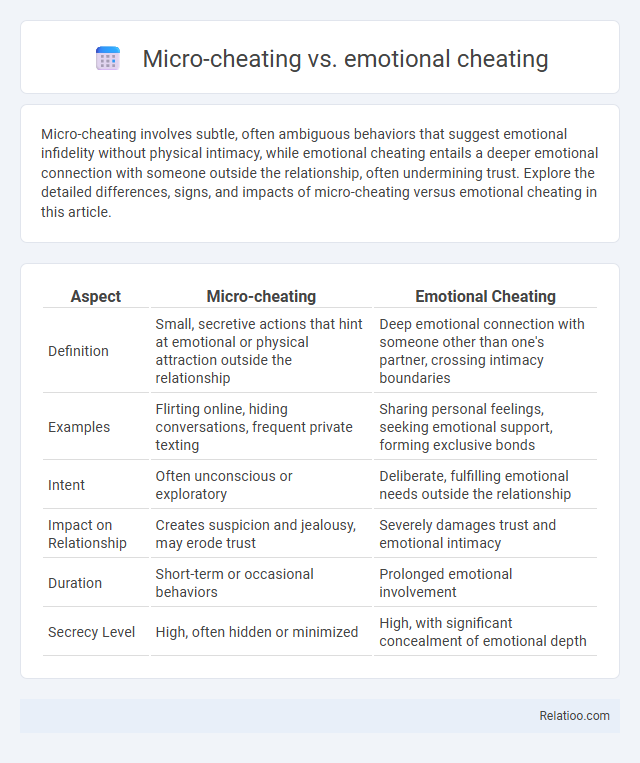Micro-cheating involves subtle, often ambiguous behaviors that suggest emotional infidelity without physical intimacy, while emotional cheating entails a deeper emotional connection with someone outside the relationship, often undermining trust. Explore the detailed differences, signs, and impacts of micro-cheating versus emotional cheating in this article.
Table of Comparison
| Aspect | Micro-cheating | Emotional Cheating |
|---|---|---|
| Definition | Small, secretive actions that hint at emotional or physical attraction outside the relationship | Deep emotional connection with someone other than one's partner, crossing intimacy boundaries |
| Examples | Flirting online, hiding conversations, frequent private texting | Sharing personal feelings, seeking emotional support, forming exclusive bonds |
| Intent | Often unconscious or exploratory | Deliberate, fulfilling emotional needs outside the relationship |
| Impact on Relationship | Creates suspicion and jealousy, may erode trust | Severely damages trust and emotional intimacy |
| Duration | Short-term or occasional behaviors | Prolonged emotional involvement |
| Secrecy Level | High, often hidden or minimized | High, with significant concealment of emotional depth |
Defining Micro-Cheating: Subtle Boundaries
Micro-cheating involves subtle actions that blur relationship boundaries without overt betrayal, such as secretive texting or emotional intimacy with others. Emotional cheating includes deeper, non-physical connections that undermine trust by fostering exclusivity and emotional dependence outside the primary partnership. Understanding these distinctions highlights how micro-cheating serves as a gray area, often seen as minor but potentially damaging precursors to full emotional infidelity.
Understanding Emotional Cheating: More Than Friendship
Emotional cheating involves forming a deep, romantic connection with someone outside your primary relationship, which often crosses boundaries beyond typical friendship. Unlike micro-cheating, which includes small, ambiguous actions that may cause doubt, emotional cheating directly impacts your trust and intimacy by prioritizing another person's emotional support over your partner's. Understanding these distinctions helps you recognize behaviors that threaten your relationship's stability and address them early.
Key Differences Between Micro-Cheating and Emotional Cheating
Micro-cheating involves subtle actions that hint at emotional disloyalty, such as flirtatious texts or secretive social interactions, while emotional cheating entails a deeper, more intense emotional connection outside the primary relationship, often including sharing intimate thoughts and feelings. The key differences between micro-cheating and emotional cheating lie in the level of emotional involvement and secrecy; micro-cheating is generally less intense and may seem harmless, whereas emotional cheating signifies a substantial emotional bond that threatens trust and intimacy. Understanding these distinctions helps you recognize the impact each type of betrayal can have on relationship boundaries and emotional security.
Signs You Might Be Micro-Cheating
Signs You might be micro-cheating include secretive texting, hiding conversations, and feeling emotionally attached to someone outside your relationship. Unlike emotional cheating, which involves deep feelings and emotional intimacy, micro-cheating consists of smaller, seemingly harmless actions that can still breach trust. Recognizing these subtle behaviors is essential for maintaining your relationship's emotional boundaries and preventing deeper issues.
Indicators of Emotional Cheating in Relationships
Indicators of emotional cheating in relationships include secretive communication, increased emotional intimacy with someone outside the partnership, and withholding information from your partner. You may notice spending excessive time texting or chatting with another person, sharing personal thoughts or feelings that were previously reserved for your partner. These subtle behaviors often blur boundaries more deeply than micro-cheating, which involves minor flirtations or attention shifts without significant emotional connection.
The Impact of Micro-Cheating on Trust
Micro-cheating involves subtle behaviors like flirting or secret messaging that undermine relationship boundaries without overt infidelity, often eroding trust incrementally. Emotional cheating, characterized by deep emotional intimacy with someone outside the relationship, significantly damages trust by creating feelings of betrayal and emotional neglect. The nuanced and often unrecognized nature of micro-cheating can lead to confusion and suspicion, making it particularly detrimental to the foundation of trust in partnerships.
Emotional Cheating: Consequences for Couples
Emotional cheating involves forming a deep, intimate connection with someone outside the primary relationship, often leading to secrecy and trust issues. This breach can cause significant emotional pain, eroding the foundation of your partnership and increasing the risk of separation or divorce. Addressing emotional cheating promptly is essential to rebuild trust and maintain a healthy, committed relationship.
Why Micro-Cheating Often Goes Unnoticed
Micro-cheating often goes unnoticed because its subtle behaviors, such as flirting through texts or secretive social media interactions, lack clear boundaries that define traditional cheating, making them easy to dismiss or rationalize. Unlike emotional cheating, which involves deep emotional attachments outside the relationship, micro-cheating consists of smaller, ambiguous actions that rarely trigger immediate suspicion. The covert nature and minimal overt commitment in micro-cheating blur the lines, allowing individuals to engage in it without alerting their partners.
How to Address Micro-Cheating and Emotional Cheating
Addressing micro-cheating requires setting clear boundaries and maintaining open communication with Your partner to identify behaviors that cause discomfort before they escalate. Emotional cheating involves deeper emotional connections outside the relationship, necessitating honest conversations about feelings, trust, and expectations to rebuild intimacy. Recognizing the subtle signs of both micro-cheating and emotional cheating and seeking couples therapy can help prevent misunderstandings and strengthen Your relationship's foundation.
Setting Healthy Boundaries to Protect Relationships
Setting healthy boundaries is essential to protect relationships from micro-cheating, emotional cheating, and physical cheating. Clearly defining acceptable behaviors and openly communicating your expectations helps you recognize and address subtle actions, such as secretive texting or emotional intimacy outside the partnership, that can erode trust. Prioritizing transparency and mutual respect strengthens your relationship and prevents the blurring of boundaries that lead to emotional or physical betrayal.

Infographic: Micro-cheating vs Emotional cheating
 relatioo.com
relatioo.com